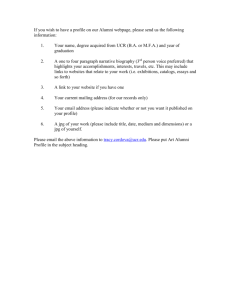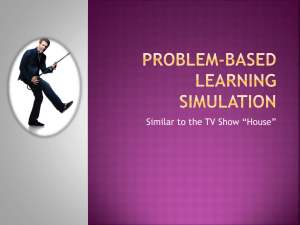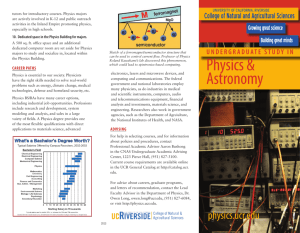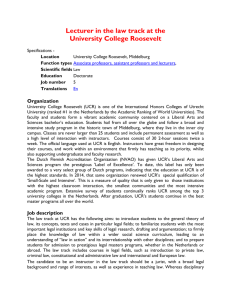Guide to Academic Recovery - CNAS Undergraduate Academic
advertisement
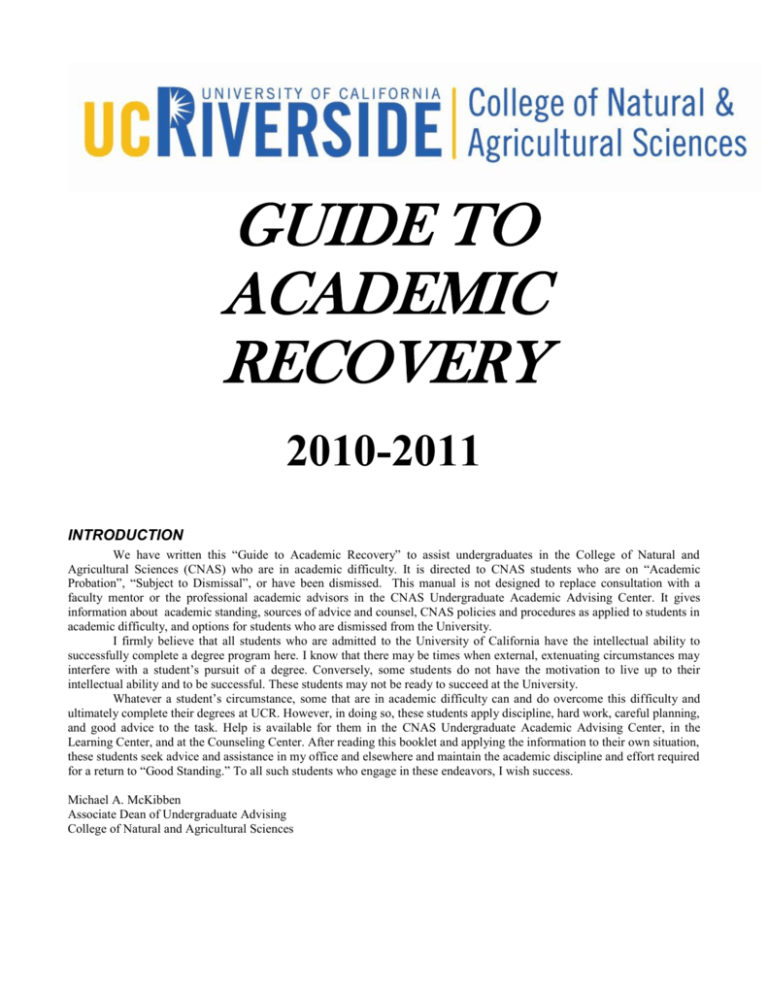
GUIDE TO ACADEMIC RECOVERY 2010-2011 INTRODUCTION We have written this ―Guide to Academic Recovery‖ to assist undergraduates in the College of Natural and Agricultural Sciences (CNAS) who are in academic difficulty. It is directed to CNAS students who are on ―Academic Probation‖, ―Subject to Dismissal‖, or have been dismissed. This manual is not designed to replace consultation with a faculty mentor or the professional academic advisors in the CNAS Undergraduate Academic Advising Center. It gives information about academic standing, sources of advice and counsel, CNAS policies and procedures as applied to students in academic difficulty, and options for students who are dismissed from the University. I firmly believe that all students who are admitted to the University of California have the intellectual ability to successfully complete a degree program here. I know that there may be times when external, extenuating circumstances may interfere with a student’s pursuit of a degree. Conversely, some students do not have the motivation to live up to their intellectual ability and to be successful. These students may not be ready to succeed at the University. Whatever a student’s circumstance, some that are in academic difficulty can and do overcome this difficulty and ultimately complete their degrees at UCR. However, in doing so, these students apply discipline, hard work, careful planning, and good advice to the task. Help is available for them in the CNAS Undergraduate Academic Advising Center, in the Learning Center, and at the Counseling Center. After reading this booklet and applying the information to their own situation, these students seek advice and assistance in my office and elsewhere and maintain the academic discipline and effort required for a return to ―Good Standing.‖ To all such students who engage in these endeavors, I wish success. Michael A. McKibben Associate Dean of Undergraduate Advising College of Natural and Agricultural Sciences STUDENT SCHOLARSHIP REQUIREMENTS ACADEMIC STANDING To remain in ―Good Standing‖ academically, a student must maintain a grade point average (GPA) of at least 2.00 (―C‖ average) in all work taken at UCR and make progress toward the bachelor’s degree in the major they have declared at a satisfactory rate. The University uses a four-point scale to calculate the GPA. Note that even if a student has met all course requirements for a degree, they will not be allowed to graduate with a cumulative or upper division major GPA below 2.0. Academic progress is deemed satisfactory if a student is maintaining the minimum GPA, is following the curriculum and course schedule for their major in the UCR catalog, and is following academic advice that they are given by faculty, advisors and the Associate Dean. ACADEMIC PROBATION Students will be placed on ―Academic Probation‖ if, at the end of any quarter, their GPA for the term is less than 2.0 but greater than or equal to 1.5. Students who were placed on "Academic Probation" in the previous quarter will remain on "Academic Probation" for one additional quarter if their cumulative GPA, computed on the total of all courses undertaken at UCR 2 , remains less than 2.0 (―C‖ average). This will be true even if the quarterly GPA is above 2.0. However, if the quarterly GPA is below 1.5 the student will be "Subject to Dismissal". (See below.) SUBJECT TO DISMISSAL Students will be automatically designated ―Subject to Dismissal‖ if: a) their grade point average is less than 1.5 for any one quarter, or b) after two consecutive quarters on "Academic Probation" or a single quarter on "Subject to Dismissal", their cumulative GPA, computed on all courses taken at the University, is less than 2.0 (―C‖ average). It is important to realize that a student can be dismissed at any time, whether or not they are ―Subject to Dismissal‖, if it is determined that they are not making satisfactory progress towards a degree, or cannot complete a degree curriculum due to an inability to pass required courses in a major. ACADEMIC GUIDELINES FOR STUDENTS ON ACADEMIC PROBATION OR SUBJECT TO DISMISSAL The following important information is designed to help you make informed decisions about your academic program so that you can return to "Good Standing." Read this entire booklet and talk to your advisor in the CNAS Undergraduate Academic Advising Center if you have questions. GRADES UCR uses both the GPA and a system called Grade Point Variance to monitor a student’s academic status. Your Grade Point Variance is a cumulative indicator of your status. It indicates whether your overall GPA is above a ―C‖ average, (a positive Variance), below a ―C‖ average (a negative Variance or ―Variance Deficit‖), or exactly a ―C‖ average (in which case your Variance is exactly 0.0). We calculate the Grade Point Variance by adding numerical values for each letter grade you have received in all UCR academic course work, according to the following scale. Note that the Variance is calculated by subtracting 2.0 (―C‖) from the numerical grade point earned for the course and multiplying the result by the number of units in the course. A physical analogy for Grade Point Variance would be elevation, where sea level is assigned an elevation of zero and any elevations above that reference point are positive. On the Variance scale, a ―C‖ average is sea level. 1 Only classes taken at UCR or through UC Summer Session calculate into the UCR Grade Point Average 2 Grade Point A/A+ A B+ B B C+ C C D+ D D F 4.0 3.7 3.3 3.0 2.7 2.3 2.0 1.7 1.3 1.0 0.7 0.0 Variance (four unit course) +8.0 +6.8 +5.2 +4.0 +2.8 +1.2 +0.0 1.2 2.8 4.0 5.2 8.0 EXAMPLE OF A VARIANCE DEFICIT If your quarterly grades are: MATH 009A F ENGL 001A C+ CHEM 001A D- Your variance will be calculated like this: (0.0–2.0)(4.0) = 8.0 (2.3 2.0)(4.0) = +1.2 (0.7 2.0)(4.0) = 5.2 Quarter GPA =1.00 -12.0 Variance Deficit To remove the ―Variance Deficit‖ in this example, you would need to earn any combination of grades with a Variance totaling = +12.0. Students may be dismissed at any time they are on ―Subject To Dismissal‖ or are otherwise not making satisfactory progress towards their degree objective. Typically students with a Variance of –10.0 or lower are likely to receive an e-mailof dismissal from the Associate Dean. Please see page 9 for further information regarding grade point average and variance point calculations. ***SPECIAL NOTES REGARDING UC SUMMER SESSION*** Grades from summer session at any UC campus will be included in your GPA and hence will affect your Variance. However, you cannot clear "Academic Probation" or "Subject to Dismissal" status with summer session grades, because academic status is only reassigned at the end of fall, winter, and spring terms. REPEATS Refer to the current UCR General Catalog regarding rules for repeating courses. Students may normally repeat once, for credit, courses in which they earned a D or F grade. Some courses impacted by high demand, however, may become more limited in regard to permitted repeats. For the first 16 units repeated, the new grade replaces the old grade in the GPA. Repetition of courses under this circumstance will result in a Grade Point Variance change given by the Variance of the new grade minus the Variance of the old grade. For example, if you repeat a four-unit course in which you originally earned an ―F‖ and received a ―B-‖ upon repetition, the effect on your grade point variance will be +10.8, as given by 2.8[Variance for a B-] – ( 8.0)[Variance for an F]. Thus for the first 16 units of repeats utilized, the positive effect on a student’s GPA Variance may be much greater than it would be for an identically graded course taken for the first time. Consult your academic advisor in the CNAS Undergraduate Academic Advising Center regarding how best to utilize your repeat options. ENROLLMENT LIMITS Students on "Academic Probation" or "Subject to Dismissal" are not permitted to take more than 15 units each quarter until they are back in Good Standing, without special approval of the Associate Dean. Students on "Academic Probation" or "Subject to Dismissal" who obtain Associate Dean’s approval to enroll in more than 15 units will never be permitted to drop courses after the posted deadline for that quarter. In order to be considered a full-time student, you must be enrolled in 12 units. Some programs such as financial aid, university housing, intercollegiate athletics, and some insurance plans may require that you be a full-time student. Consult your academic advisor regarding program planning for your major. 3 SATISFACTORY/NO CREDIT (S/NC) GRADING OPTION Students who are on "Academic Probation" or "Subject to Dismissal" must take all courses for a letter grade and may not enroll in courses that are graded satisfactory/no credit (S/NC). Internship course enrollment is not allowed under these circumstances either. With the exception of English 1, courses required for a CNAS major (and their prerequisites) cannot be taken S/NC, unless a student is in the process of changing majors to another college that does not require the course. PREREQUISITES You are responsible for checking the current UCR General Catalog for course prerequisites. Prerequisites are not always listed in the quarterly Schedule of Classes. Do not enroll in a course for which you lack the prerequisites. If you are a freshman, you should not enroll in upper-division courses (100 through 199). If you are in a sequential course in the sciences or mathematics, you should pass the preceding course in the sequence with a grade of ―C ‖ or better before attempting the next course in the sequence. WITHDRAWAL If you expect to fail two or more courses in any term, you should consider withdrawing from the entire quarter before taking finals. Notify your academic advisor and complete an application for withdrawal at the CNAS Undergraduate Academic Advising Center, with approval of one of the CNAS College advisors in the east wing of the office. Readmission in future quarters is not automatic in such cases. You will need to speak with a College Advisor to discuss your options for readmission. The deadline to withdrawal from the entire term is before 4:00 pm on Friday of the 10th week (last day of instruction), before final examinations. DISCONTINUANCE FROM A MAJOR CNAS students who are not making adequate progress towards meeting degree requirements in their declared major may be discontinued from that major. Each declared major in the College has specific criteria for discontinuance. Interested students may obtain these criteria from their advisor, or from their faculty advisor in their major department. If you have been discontinued from your major and your GPA is below a 2.0, the CNAS Undergraduate Academic Advising Center will automatically file a Change of Major Petition for you to become an Undeclared (NAUN) student in the College. Discontinued students on "Academic Probation" or "Subject to Dismissal" must become an undeclared student since only students in Good Standing are permitted to declare a new major. If you are discontinued from your major and your GPA is above a 2.0, you may be able to declare a new major. Proposed major changes must meet posted major criteria and be approved by the major advisor for that department. Students with 90 or more earned units who are discontinued from a major are given only one academic quarter to be an undeclared student and must declare a new major or transfer to another college before they will be allowed to register for the next academic quarter. THE ACADEMIC CONTRACT Students who are experiencing academic difficulties, especially those on "Subject to Dismissal", are often placed on an Academic Contract. Students who need to sign an academic contract will be notified via their UCR R'Mail from their academic advisor. The student’s advisor will draw up such a contract in consultation with the student, for the next academic quarter. Such contracts should be signed after the student has registered for classes but no later than the end of the second week of the quarter in which they are on "Academic Probation" or "Subject to Dismissal". These contracts specify exactly the courses that must be taken and the minimum grade performance that is expected in the next academic term. Failure to complete the specified courses or to meet the minimum grade performance means that you have failed the contract and may be dismissed. Other requirements may also be specified. There are two types of academic contracts—major contracts, and college final contracts. Both contracts are designed to encourage your return to good standing and ultimately graduate from the university. These contracts may be written for more than one quarter until you return to good standing. These two types of contracts are discussed below: MAJOR CONTRACTS Your major academic advisor will inform you if you need to sign a major contract. Generally, this contract will specify courses that you must take and the grades that you must receive to avoid discontinuance from your major. A serious failure to meet the departmental contract may also result in dismissal from the university. COLLEGE FINAL CONTRACTS The CNAS Associate Dean for Undergraduate Advising will inform you if you need to be placed on a college contract via UCR R'Mail. Students who are undeclared, have been discontinued from their major, or are in a declared major 4 can be required to sign a college final contract. This contract will specify the courses that you must take and the grades you must receive. Failure to meet the terms of this contract will likely result in dismissal from the university, regardless of the student’s Grade Point Variance. CNAS CRITERIA FOR ACADEMIC DISMISSAL Students who are placed on "Subject to Dismissal" (STD) are in danger of being dismissed from UCR. Students who are dismissed will be notified via UCR R'Mail from the cnasstudent@ucr.edu account. In some instances, a student who is not making adequate progress towards a degree may be dismissed even though not on STD status. Furthermore, current CNAS policy dictates that Academic Dismissal may occur when a student’s Grade Point Variance falls below –10.0. For those students with a slightly higher variance, other factors such as repeat units available for grade replacement credit, and total units completed may be considered in the dismissal decision. In the event of a notice of academic dismissal, CNAS students have the right to request a review of the dismissal decision. If the dismissal still holds after the review, the student then has the right to schedule an appointment with the Associate Dean to discuss the reasons for the dismissal and receive advice about returning to good academic standing. READMISSION OF CNAS STUDENTS WHO HAVE BEEN DISMISSED Many different problems may have contributed to a student’s academic difficulties at UCR, including inadequate academic preparation, ill-conceived choice of major or courses, time conflicts due to employment, severe illness or emotional distractions or other personal problems, and financial pressures. It is critical that you examine the issues involved in your own performance and that you make realistic choices regarding the continuation of your education here or at another institution. The College supports your desire to complete your education here at UCR. If you have been dismissed from CNAS for academic reasons, however, you must demonstrate above average grades in a rigorous mathematics and science curriculum at UCR Extension or UC Summer Session before seeking readmission. READMISSION TO UCR IS NOT GUARANTEED The choices you make in constructing your course program and the level of academic proficiency that you achieve in repairing your academic record will determine whether or not the College will approve your application for readmission. The following information should serve to guide you in creating a program that will meet your scholarship needs as well as the readmission requirements of the College. However, to determine if you have a chance for readmission, you must file a Dismissal Review Petition with the College office at the CNAS Undergraduate Academic Advising Center. The Associate Dean will then outline your options and requirements for your return to UCR. Readmission will normally be considered only after sufficient and satisfactory full-time course work in UCtransferable graded courses have been completed at UCR Extension or UC Summer Session. ―Sufficient‖ refers to the number of total units needed to repair a negative variance. ―Satisfactory‖ means a B average ( 3.0) with no grade below a ―C‖. The larger a dismissed student’s negative variance, the more units that are required for repair. Repairing poor grades in CNAS courses takes priority over repairing poor grades in non-science and breadth courses. Students who repair their UCR GPA via non-science and breadth courses, while not repairing their poor grades in CNAS courses, may not be readmitted. DO I NEED TO REAPPLY FOR READMISSION? Students who are not enrolled in a regular session for one quarter need to formally apply for readmission. This also applies to all students who have been officially dismissed from the University or students who have withdrawn from the previous quarter. Readmission Applications are available at the CNAS Undergraduate Academic Advising Center in 1223 Pierce Hall, (951) 827-7294. Once your readmission application has been reviewed, you will be notified by email to pick up your Readmission Application if it has been approved. You will receive e-mail notification if your Readmission Application has been denied. If your readmission application is approved, you will need to pick up the application from the CNAS Undergraduate Academic Advising Center and then pay a non-refundable processing fee at the UCR Cashier’s Office. Your paid Readmission Application then must be taken to the UCR Registrar’s Office for final processing. Once the Registrar's Office has received your readmission approval and the fee has been paid, a registration packet will be generated and emailed to you at your e-mail address. Although it is crucial to file your readmission application on time, no action will be taken on your Readmission Application until the Associate Dean has reviewed your final grades showing the courses taken through UCR Extension, UC Summer Session, or elsewhere. When you have completed sufficient units, as described above, submit the Readmission Application to the Associate Dean along with transcripts and/or grade cards showing your completed course work. If you are readmitted to UCR, arrange to have an official transcript sent to the UCR Undergraduate Admissions as soon as possible. 5 COURSEWORK Remember that you are trying to demonstrate to the College that if you are readmitted, you can succeed in the rigorous CNAS academic environment. Choose classes that will repair poor CNAS course grades, prepare you for your intended major, meet major requirements, or satisfy breadth requirements. If you are considering entering a major with specialized requirements, discuss your plans with a department advisor. It is strongly suggested that you pick up a copy of your UCR transcript or obtain your complete grade report from Growl so that when you sign up for courses you understand your academic situation. Take only UC-transferable courses. Keep in mind that if you take transferable courses at a non-UC school, your subject credits and units will be counted toward your UCR degree, but the grades will not be calculated into your GPA. Thus, do not repeat ANY class you have already taken at UCR at a non-UC school. Such repeats will not provide you with grade replacement and will preclude you from repeating these courses later at UCR. Confirm transferable courses with your major advisor in the CNAS Undergraduate Academic Advising Center or through the web site www.assist.org. You may, however, repeat (once) a UCR course through concurrent enrollment at UCR Extension or UCR Summer Session. Upon readmittance to UCR, your grades will then be combined with your existing UCR GPA. If you have exhausted your one repeat (second try) of a course at UCR prior to dismissal, you may not repeat the course again (third try) off-campus. Special Note About Senior Residency: In order to receive a baccalaureate degree from UCR, students must earn a total of 180 units with a maximum of 216 units; fulfill university, college, and department requirements; achieve a 2.0 cumulative GPA as well as a 2.0 GPA in their upper division major courses; and earn a minimum of 35 of their last 45 units in residence at UCR. Please note that classes taken through UCR Extension during Fall, Winter and Spring quarters are not considered to be taken in residence. UNIVERSITY EXTENSION Courses taken through UCR Extension are called ―concurrent‖ and are prefixed XLC. In this approach you may attend and complete a class offered in regular session at UCR but you enroll in the class through University Extension. While this option allows for a greater choice of classes, certain classes, such as breadth requirements and preparation for the major, may be difficult to add to your schedule because continuing UCR students are given for priority registration over concurrent enrollment students. Call (951) 827-4105 for more information. All former UCR students must obtain the Associate Dean’s approval to take any courses through UCR Extension. To obtain approval, you will need to submit a UCR Extension Enrollment form for each course, a copy of the CNAS Extension Concurrent Enrollment Form and an unofficial copy of your UCR Extension transcript showing all previously earned UC Extension grades. Please note that grades from courses taken through UCR Extension are calculated into your UCR GPA upon readmission. Remember each course grade earned must be at least a ―C‖ with a 3.0 overall GPA. You may repeat any class once through Extension concurrent enrollment that you have previously taken once at UCR, if you earned a D+ or below or N/C grade. Note that financial aid is not available for students taking courses through UCR Extension. UCR AND OTHER UC CAMPUS SUMMER SESSION There are two, main UCR Summer Sessions offered each year. The course number and the subjects are identical to those in regular year sessions. Each session spans 5 or 6 weeks although there are some courses that may have a different length. (e.g., CHEM 112A, 112B, and 112C are each offered in 3-week sessions for each quarter). If you are readmitted to UCR, you will be awarded credit for the work you completed in Summer Session, including unit and grade point credit in your UCR GPA. Courses repeated in Summer Session will allow grade replacement credit to the extent (i.e., up to 16 units in which a D+ or below was previously earned) allowed normally. See ―Coursework‖ section above. Please consult the Summer Session office for current fees. There is a base term fee and an additional fee per unit for most courses. Remember each course grade earned must be at least a ―C‖ with a 3.0 overall GPA. Summer Session is a constructive option for those students who need to complete specific requirements and are able to attend summer classes. Summer session courses at other UC campuses may also be used to complete your requirements. Please consult your academic advisor for assistance in choosing appropriate classes at other UC campuses to ensure they will meet UCR degree requirements. Courses taken at UC Summer Sessions will also count in your UCR GPA. 6 CREDIT FOR WORK TAKEN WHILE IN DISMISSED STATUS If you are readmitted, you will be awarded the course credit and in most instances, the unit credit, for all transferable courses you took while in ―dismissed status.‖ An official transcript must be mailed directly to UCR Undergraduate Admissions. Consult your Professional Academic Advisor at the CNAS Undergraduate Academic Advising Center for more information. QUESTIONS You may schedule an appointment with a Professional Academic Advisor in the CNAS Undergraduate Academic Advising Center. They are available to help you, Monday, Tuesdays, Thursdays and Friday from 9:00 a.m. to Noon and 1:00 p.m. to 4:00 p.m. Advisors are also available on Wednesdays from 10:00 a.m. to Noon and 1:00 p.m. to 4:00 p.m. You may call (951) 827-7294 during these hours to set up an appointment with your Professional Academic AdvisorGRADE POINT AVERAGE & VARIANCE POINT CALCULATIONS GRADE POINT CHART GRADE A A- B+ B B- C+ C C- D+ D D- F 6 24 22.2 19.8 18 16.2 13.8 12 10.2 7.8 6 4.2 0 5 20 18.5 16.5 15 13.5 11.5 10 8.5 6.5 5 3.5 0 4 16 14.8 13.2 12 10.8 9.2 8 6.8 5.2 4 2.8 0 3 12 11.1 9.9 9 8.1 6.9 6 5.1 3.9 3 2.1 0 2 8 7.4 6.6 6 5.4 4.6 4 3.4 2.6 2 1.4 0 1 4 3.7 3.3 3 2.7 2.3 2 1.7 1.3 1 0.7 0 UNITS VARIANCE POINT CHART GRADE A A- B+ B B- C+ C C- D+ D D- F 6 +12 +10.2 +7.8 +6 +4.2 +1.8 0 -1.8 -4.2 -6 -7.8 -12 5 +10 +8.5 +6.5 +5 +3.5 +1.5 0 -1.5 -3.5 -5 -6.5 -10 4 +8 +6.8 +5.2 +4 +2.8 +1.2 0 -1.2 -2.8 -4 -5.2 -8 3 +6 +5.1 +3.9 +3 +2.1 +0.9 0 -0.9 -2.1 -3 -3.9 -6 2 +4 +3.4 +2.6 +2 +1.4 +0.6 0 -0.6 -1.4 -2 -2.6 -4 1 +2 +1.7 +1.3 +1 +0.7 +0.3 0 -0.3 -0.7 -1 -1.3 -2 UNITS 7 For each unit of course work taken for a grade, grade points and variance points are assigned, as shown on the above table. The University requires that a student maintain a grade point average of 2.0 to remain in Good Standing. The plus and minus figures in the variance points indicate variance from the required 2.0. For example: B+ in a 4 unit course will provide +5.2 variance points above a ―C‖ (0.0 variance); a D+ in a 3 unit course will deduct -2.1 from a ―C‖ (0.0 variance). Please note that courses taken on a Satisfactory/No Credit (S/NC) basis are not involved in any grade point or variance point calculations. ACADEMIC ADVISING RESOURCES CNAS UNDERGRADUATE ACADEMIC ADVISING CENTER COLLEGE OF NATURAL AND AGRICULTURAL SCIENCES (CNAS) 1223 PIERCE HALL (951) 827-7294 or (951) 827-3102 The CNAS Office of Student Academic Affairs is responsible for academic advising for all college and major requirements, "Academic Probation", "Subject to Dismissal", questions about degree requirements, assistance in choosing majors and other academic issues. Visit the CNAS Undergraduate Academic Advising Center web site at www.cnasstudent.ucr.edu. Student's Last Name begins with A-S T-Z Linda Vigil Denise Correll linda.vigil@ucr.edu denise.correll@ucr.edu Biology and Biological Sciences A-F G-L M-O P-Z Amber Newell Bill Sovich Denise Correll Poinka Wong amber.newell@ucr.edu william.sovich@ucr.edu denise.correll@ucr.edu poinka.wong@ucr.edu Chemistry A-S T-Z Nadiyah El-Amin Rena Roberts nadiyah.elamin@ucr.edu rena.roberts@ucr.edu Entomology All Michelle Butler michelle.butler@ucr.edu Environmental Sciences All Nadiyah El-Amin nadiyah.elamin@ucr.edu Geology, Geophysics and Geoscience Education All Nadiyah El-Amin nadiyah.elamin@ucr.edu Mathematics and Mathematics for Teachers of Secondary Schools All Rena Roberts rena.roberts@ucr.edu Neuroscience All Kacy Norlin kacy.norlin@ucr.edu Physics All Aaron Bushong aaron.bushong@ucr.edu Plant Biology All Denise Correll denise.correll@ucr.edu Statistics All Rena Roberts rena.roberts@ucr.edu Major Biochemistry 8 Professional Academic Advisor E-mail Other Campus Resources CAREER CENTER VEITCH STUDENT CENTER, NW WING (951) 827-3631 Services include helping students with career decisions and competing effectively in the job market. Assistance is available in securing internships for career exploration. Visit the Career Center web site at www.careers.ucr.edu. COLLEGE OF HUMANITIES, ARTS AND SOCIAL SCIENCES 3400 HUMANITIES AND SOCIAL SCIENCES BUILDING (951) 827-3683 Academic Advising for students wishing to pursue majors in the College of Humanities, Arts and Social Sciences. This office provides assistance with CHASS readmission criteria including UCR Extension Concurrent Enrollment approvals. COUNSELING CENTER (PSYCHOLOGICAL) VEITCH STUDENT CENTER, NW WING (951) 827-5532 Counseling services are available to students having personal problems that may be interfering with their education experience. Psychologists can administer and interpret career and educational planning inventories. Visit the Counseling Center web site at www.students.ucr.edu/counseling. INTERNATIONAL SERVICES CENTER 319 SURGE BUILDING (951) 827-4113 Assists foreign students with most legal, financial, and housing concerns in addition to sponsoring cultural and education programs. Visit the International Services Center web site at www.internationalcenter.ucr.edu. ACADEMIC RESOURCE CENTER (formerly Learning Center) 156 SURGE BUILDING, 1st FLOOR (951) 827-3721 Professional and peer counselors, as well as tutorial services, are available to students. Visit the ARC web site at www.learningcenter.ucr.edu. OFFICE OF THE OMBUDSPERSON UNIVERSITY COTTAGE (951) 827-3213 Listens to grievances from any member of the campus community. Visit the Ombudsperson web site at www.ombudsperson.ucr.edu.
